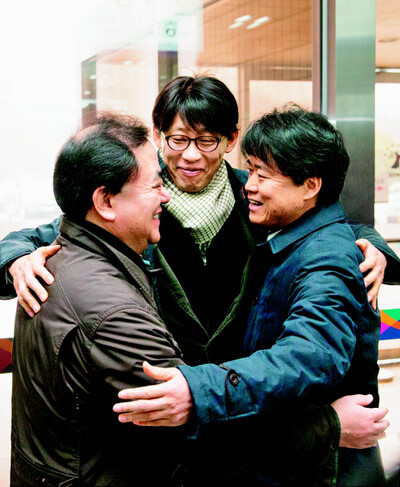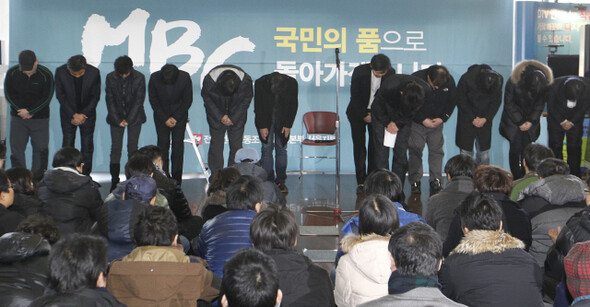hankyoreh
Links to other country sites 다른 나라 사이트 링크
Court rules in favor of dismissed MBC reporters

By Choi Won-hyung, staff reporter
A court has decided to invalidate MBC’s (Munhwa Broadcasting Corporation) decision to fire and take disciplinary measures against striking union members. MBC’s duty to guarantee the fairness of broadcasting also applies to working conditions, the court ruled. As such, the company’s abuse of its authority over personnel decisions interfered not only with working conditions but also with fair broadcasting. The court also acknowledged the legitimacy of the unionists’ strike.
On Jan. 17, the 13th civil division of the Seoul South District Court ruled in favor of the plaintiffs in a suit brought against MBC by 44 unionists, including former union chairman Jeong Young-ha. The union members had asked the court to confirm that the broadcasters’ decision to terminate and suspend them was invalid.
In its decision, the court reversed MBC’s termination and suspension of former employees and ordered it to pay 20 million won (US$18,860) to each of the six terminated employees and 10 million won to each of the suspended employees.
MBC took disciplinary measures against Jeong and the other 43 unionists when they went on strike from Jan. to July 2012, demanding fair broadcasting. This is when the strikers filed a lawsuit, calling MBC’s decision an inappropriate use of its personnel authority.
“The responsibility of management and labor to provide fair broadcasting applies to the working conditions that form the basis of working relations. In addition, putting in place a platform for ensuring fair broadcasting and maintaining that platform is not a matter that is left to the discretion of the working relationship, but is rather the duty of the employer,” the court ruled.
“The management did not convene the fair broadcasting committee as stipulated by the collective agreement but rather replaced production teams arbitrarily in violation of the personnel regulations. [. . .] The union strike was not an attempt to remove certain executives. Rather, it was organized in opposition to executives who were judged to be capable of infringing on the fairness of broadcasting. As such, we recognize that the strike had a legitimate objective,” the court said.
MBC had argued that the strike was illegal, claiming that its objective was not improving working conditions but rather forcing the company president to resign.
The court’s verdict on Friday recognized “the fairness of broadcasting” as a working condition at the broadcaster. It is being regarded as a groundbreaking decision. Also noteworthy was that the court stated that the yardstick for judging the fairness of broadcasting is whether or not there is an internal democratic decision-making process at the broadcaster.
“The responsibility to provide fair broadcasting is a principle that creates the foundation for working conditions,” the court ruled. “Putting in place a platform for ensuring fair broadcasting and maintaining that platform is a mandatory part of collective bargaining.” Emphasizing that the fairness of broadcasting is a working condition at broadcasters, the court ruled that it is possible to call a strike to guarantee the objectivity and fairness of reporting at a broadcaster or other media organization, something that is not possible at an ordinary corporation.
To prevent “fairness of broadcasting” from being viewed too vaguely, the court presented some clear standards. “Fairness of broadcasting,” the court explained, “cannot be judged based on the final product alone. Rather, determining this involves asking whether democratic decision-making took place during the production and editing phases of the broadcast and whether employees were freely able to participate and express their opinions.”
Based on this, the court found that “the management violated several procedural regulations in the collective agreement for guaranteeing the fairness of broadcasting and abused its human resources authority. These were the methods it used to suppress a variety of opinions of employees in the company in an attempt to produce and edit only programs that agreed with the values and interest of the management.” The union was justified in striking in response to this behavior, the court ruled.
The court’s decision was welcomed by media scholars. “This demonstrated the fact that the working conditions of journalists are not a private issue but must rather be judged in consideration of the interest of society as a whole,” said Sungkonghoe University professor Kim Seo-jung. “The decision showed with particular clarity the specific means by which freedom of expression, which is guaranteed by the constitution, can be ensured in the media.”
“There had been a lot of decisions that looked into the process, procedure, and extent of disciplinary measures against journalists, but I don’t recall there being any decisions that dealt with working conditions the way this decision did,” Kim said.
“This is a revolutionary decision that defines the arena of journalism as including not only the simple act of reporting but also efforts to create the conditions required for fair reporting,” said Kim Chang-ryong, professor at Inje University. “The threat of reprisals at the workplace has been gradually impeding journalists’ efforts to make fair reports. This decision will put some wind back in the sails of journalists so they can make this effort.”
Meanwhile, on the same day, Cho Sang-uk, former labor union chairman for the Kookmin Ilbo, who was fired after criticizing the company owner, was also vindicated by the courts. In an appellate trial, Seoul High Court ruled that Cho’s termination had been illegal. Siding with Cho, the court noted that it is necessary for people inside media companies to monitor and provide a check on company management.
A total of 16 journalists - including the some terminated from MBC and Cho - are still waiting to return to their jobs after being fired during the previous administration of President Lee Myung-bak. In the case of YTN, which resisted the appointment of a “parachute president” in 2008 - even earlier than MBC and KBS (Korea Broadcasting System) - there are six terminated employees, including Roh Jong-myeon, former leader of the labor union. The lower court ruled to invalidate the termination of all six of these individuals, but the appellate court only upheld that ruling for three of the six. They are currently waiting for the Supreme Court to rule on the case.
After the verdict in the MBC case was issued, the YTN released a statement saying that “The legal validity of labor disputes over fair broadcasting has been confirmed once again. MBC and YTN need to stop ignoring the decisions of the courts and the National Assembly and immediately reinstate the reporters that they fired.”

Please direct questions or comments to [english@hani.co.kr]

Editorial・opinion
![[Column] Park Geun-hye déjà vu in Yoon Suk-yeol [Column] Park Geun-hye déjà vu in Yoon Suk-yeol](https://flexible.img.hani.co.kr/flexible/normal/500/300/imgdb/original/2024/0424/651713945113788.jpg) [Column] Park Geun-hye déjà vu in Yoon Suk-yeol
[Column] Park Geun-hye déjà vu in Yoon Suk-yeol![[Editorial] New weight of N. Korea’s nuclear threats makes dialogue all the more urgent [Editorial] New weight of N. Korea’s nuclear threats makes dialogue all the more urgent](https://flexible.img.hani.co.kr/flexible/normal/500/300/imgdb/original/2024/0424/7317139454662664.jpg) [Editorial] New weight of N. Korea’s nuclear threats makes dialogue all the more urgent
[Editorial] New weight of N. Korea’s nuclear threats makes dialogue all the more urgent- [Guest essay] The real reason Korea’s new right wants to dub Rhee a founding father
- [Column] ‘Choson’: Is it time we start referring to N. Korea in its own terms?
- [Editorial] Japan’s rewriting of history with Korea has gone too far
- [Column] The president’s questionable capacity for dialogue
- [Column] Are chaebol firms just pizza pies for families to divvy up as they please?
- [Column] Has Korea, too, crossed the Rubicon on China?
- [Correspondent’s column] In Japan’s alliance with US, echoes of its past alliances with UK
- [Editorial] Does Yoon think the Korean public is wrong?
Most viewed articles
- 1‘We must say no’: Seoul defense chief on Korean, USFK involvement in hypothetical Taiwan crisis
- 2N. Korean delegation’s trip to Iran shows how Pyongyang is leveraging ties with Moscow
- 3Amnesty notes ‘erosion’ of freedom of expression in Korea in annual human rights report
- 4[Column] Park Geun-hye déjà vu in Yoon Suk-yeol
- 5‘Weddingflation’ breaks the bank for Korean couples-to-be
- 6[Reportage] On US campuses, student risk arrest as they call for divestment from Israel
- 7[Guest essay] The real reason Korea’s new right wants to dub Rhee a founding father
- 8[Editorial] New weight of N. Korea’s nuclear threats makes dialogue all the more urgent
- 9Will NewJeans end up collateral damage in internal feud at K-pop juggernaut Hybe?
- 10Why Korea shouldn’t welcome Japan’s newly beefed up defense cooperation with US